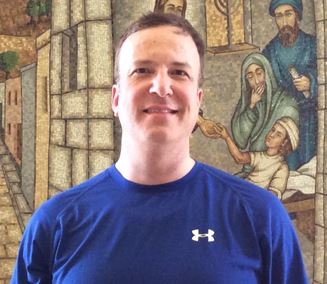
Most of us, I suspect, live with some level of fear, especially during these unprecedented times as the coronavirus cases rise around the world. Though our fears can be debilitating, all too often our worries are unfounded. The worst that can happen rarely does. On this Second Sunday of Lent, we see Jesus as transfigured before his disciples who fall to the ground and are overcome by fear. But Jesus comes and touches them, saying, “Get up and do not be afraid.” A mind blocked by fear, anxiety, anger, resentment isn’t able to experience a true spiritual awakening.
When the three disciples, Peter, James and John, are overcome with fear, Jesus touches them and says, “Get up.” But it’s more than just “get up.” A more literal translation would be something like “be raised up,” “be awokenfrom your sleep,” or maybe even “be resurrected.” As the term implies, we “wake up” from the dream of everyday, mundane material-level, ego-based awareness to a higher reality of spirit. Regardless of how the spiritual awakening process occurs, the result is, among other benefits, increased self-awareness, enhanced feelings of empathy, peace and self-acceptance.
When we undergo a spiritual awakening, we literally “wake up” to life. We begin to question our old beliefs, habits and social conditioning, and see that there is much more to life than what we have been taught. While the spiritual awakening process can feel painful and disturbing at first, it ultimately helps us to live a more meaningful life. The sensation that our life doesn’t make sense anymore is the product of having all of our former beliefs, desires and paradigms challenged and often disproven. This is traumatic, but a necessary part of our expansion.
Jesus recognizes that fear isn’t designed to keep us inactive, but to help us act in ways that generate a new hope. Before the transfiguration, six days earlier according to Matthew, Jesus was teaching his disciples about his impending suffering and death. Now, the three of them are going up to a mountain to pray, and suddenly the transfiguration of Jesus occurs. Moses and Elijah are the highly emblematic figures representing the Law and the Prophets—the whole essence of the Jewish faith. Placing Jesus in their midst was making a strong statement about his role in fulfilling the Law and the Prophets and opening a door to an expanded spiritual awareness.
Joseph Campbell, who authored “The Power of Myth,” wrote that the path of spiritual awakening is the grandest adventure we can ever undertake. Campbell said that we are all deeply privileged when we recognize the truth that such a journey stands before each one of us, and embracing it is nothing less than following the heroic call of our life purpose and destiny. A call to adventure is the spark that triggers a spiritual awakening. “Every life has a moment, if seized, that will change that life forever.” The call to adventure is an awakening incident, a new perception that compels us to look at life differently. This spiritual experience can take countless forms—a trip, an illness, a challenge, the death of a close friend, a near-death experience, or the loss of a job. Regardless of the particulars, the experience shakes our worldview and we see the world with new eyes. We are called to live the ordinary life in a non-ordinary way.
Put simply, spiritual awakenings mark the beginning of our initiation on the spiritual path. Without experiencing a spiritual awakening, we go throughout life pursuing the emptiness of money, fame, power and respect in an attempt to find “happiness.” The unsettling and equally beautiful thing about spiritual awakenings is that they occur at the least expected times. There is no way you can plan for them. The spiritual path is not without struggle, however. By its very nature, the path of awakening confronts us with our shortcomings, self-deceptions, cognitive biases and resistance to change.
In the transfiguration, the disciples see “the divine” in Jesus. They see what Jesus had been teaching them all along, that this chosen path challenges us to change our thoughts, emotions, speech or behavior to be more expansive, compassionate, forgiving and kind. The Transfiguration represents a focal point of God’s Kingdom—Christ fulfilling the Old Testament prophesies—the cross, resurrection, and His eternal glory. All God’s spiritual favors await those who place their trust in Jesus. Jesus Christ, God’s Word made flesh, offers us magnificentillumination and transformation when we are willing to follow the heroic call of our life purpose and destiny.
Questions For Your Personal Reflection: What would it take to adopt a spiritual vision of your own life? Have you tried to expand your consciousness beyond your well-known world? What is the inner work that you need to do to get a glimpse of spiritual awakening? What are those things in your life that you give your whole self to? What personal activities, pursuit, or interests are you most seized by? If you were confronted with a situation of total disaster, if everything you loved and thought you lived for were devastated, what would you live for? What is the great thing for which you would give your life? What makes you do what you do? What is the call of your life to you?